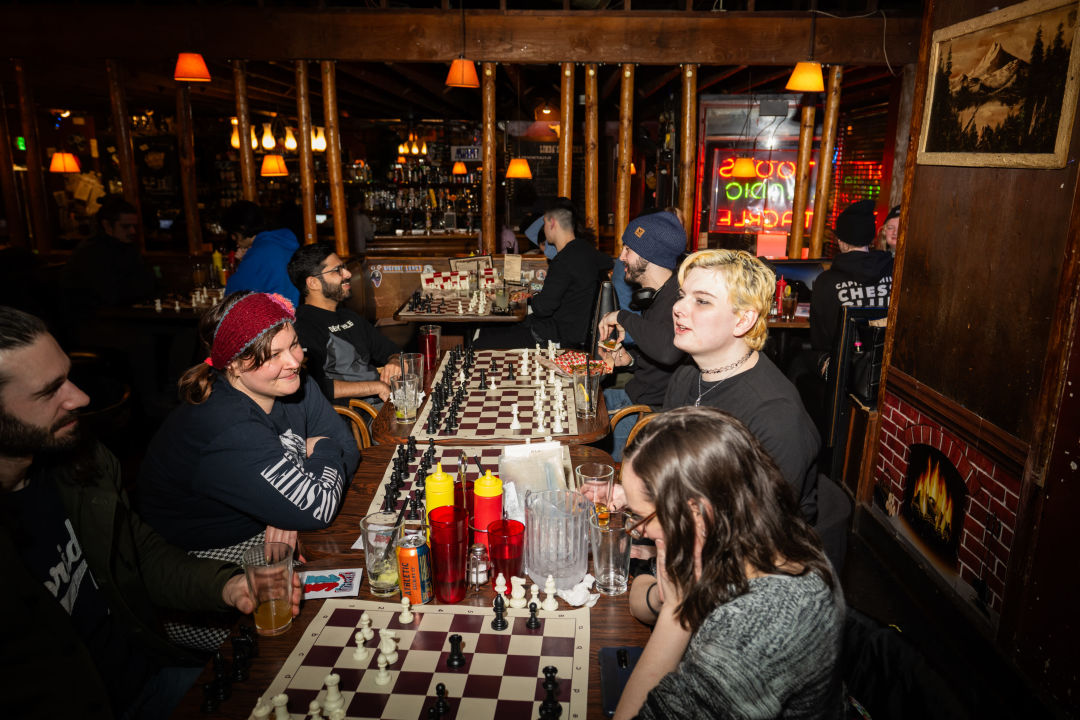Chess Is Taking Over Seattle Bars

The chess club that started at Linda's Tavern has expanded well beyond Capitol Hill.
Image: Chona Kasinger
Almost nothing about Linda’s Tavern announces it as a venue for chess. There’s a shaggy buffalo head above the bar, arcade games in the back, and Taylor Swift booming above a near-constant din. It’s not the setting one imagines for playing a famously intense game.
But there are tables. And so on an otherwise quiet Monday, I watched a paradoxical nightlife phenomenon once again unfold, quite literally, at the Capitol Hill bar where Kurt Cobain was supposedly last seen.
Across from the taxidermy, organizers unfurled chess boards across tables as dozens of rowdy young professionals gathered for Chess Club. Conversation and booze flowed freely; a club member who walked my beginners group through the difference between a pawn and a rook was sloshed before sundown. The weekly event lived up to its cheeky billing as “a drinking club with a chess problem.”
That was in May 2022. When I returned in November of 2023, the club had acquired a more laid-back vibe as it matured from a word-of-mouth weekly gathering spot to a bona fide player in the city’s geeky, post-Nirvana nightlife scene. “I don’t drink anymore,” said club organizer Finn Raftery, sitting next to Big Buck Hunter on a plastic container filled with the pieces and boards the club keeps at Linda’s.

Bryan Keleman (Harvard cap) had considered starting a chess club after uprooting from Boston, but soon discovered Finn Raftery (furry cap) had already “captured the ideology of what I think chess should be.”
Image: Chona Kasinger
Though the grunge landmark remains its hub, the club now holds down tables at Pub 70 in Belltown and Tio Baby’s in Wallingford on Mondays; Big Time Brewery in the U District on Tuesdays; Oak in Beacon Hill and Halcyon Brewing in Greenwood on Wednesdays; and the sister bar of Linda’s, King’s Hardware, in Ballard, on Thursdays. The new pitch is simple, Raftery says: “a place to play chess and make friends.”
The lack of pretension is intentional. Though chess has long occupied social spaces like coffeehouses, it can also intimidate casuals. Raftery can easily recall the anxiety of competing from a young age in Seattle, where his father started a club in 1988. And in his own club’s early days at Summit Public House on Capitol Hill in 2018, Raftery acknowledges, Chess Club was usually “just chess nerds” around a few boards.

Image: Chona Kasinger
But after the release of Netflix hit the Queen’s Gambit and Seattle’s post-vaccination reopening, Raftery and company found a broader audience looking for connection through the game. Hip flyers designed by Caitlin Larson—Linda’s nights usually get a Western theme, and King’s feature a certain chess piece—helped draw enthusiasts with different backgrounds and levels of experience inside. “There’s no profile of a chess player,” Raftery says. “If you know how the pieces move, you’re a chess player.”
In the U District, students and “chess heads” might mingle in a community that’s long been a brainy hub for the game, while young transplants might try to cut through the Freeze at Linda’s. “When I moved here a year ago, I had nobody,” said Bryan Keleman, who was hosting the gathering on this particular night at Linda’s.

Image: Chona Kasinger
Keleman had considered starting a chess club after uprooting from Boston, but soon discovered Raftery had already “captured the ideology of what I think chess should be.” During one night at Linda’s, Keleman found more than that; a fellow player told Keleman about her dance class. Keleman now go-go dances at SoDo nightclub Supernova and promotes raves and underground parties. “The people who got me into that scene,” they said, “I met at Chess Club.”
Though the beginners table I joined at Linda’s and a beginner’s night at Rose Temple are no longer extant, Raftery says they could well return. For now, newcomers to the game can lean on a culture of teaching ingrained in the chess ethos.

Image: Chona Kasinger
Aasish Basani, who recently moved to the area from Georgia, has heard that “reviews” from more experienced players can help expedite the learning process. The transplant hadn’t requested one yet but did spot a fellow newcomer on this night and asked for a game. They exchanged numbers after.
But playing isn’t a prerequisite for making friends at Chess Club.
“What’s really nice about it,” Larson told me earlier that night, surveying the packed tables, “is you don’t necessarily have to play to have a good time.”




